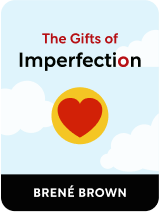

This article is an excerpt from the Shortform book guide to "The Gifts of Imperfection" by Brené Brown. Shortform has the world's best summaries and analyses of books you should be reading.
Like this article? Sign up for a free trial here .
Why is it important to balance work, rest, and play? How can you overcome the pressure to be productive?
In her book The Gifts of Imperfection, Brené Brown explains that embracing rest and play is a crucial part of living Wholeheartedly. Refusing to engage in play and rest can lead to depression and has been linked to serious health conditions.
Learn why you should leave “hustle culture” behind and learn to balance work, rest, and play.
Balance Work, Rest, and Play
The seventh guidepost for living Wholeheartedly is to balance work, rest, and play. Before we discuss why these two factors are so important, we need to define them.
When defining play, Brown follows the lead of psychologist Dr. Stuart Brown. Dr. Brown believes play is doing things that have no real purpose. We do these things simply because we enjoy them, not because we’re hoping to achieve something. What constitutes “play” is unique to the individual. It could be reading for pleasure, playing sports, playing video games, painting, or watching a movie.
When Brown refers to rest, she means getting enough sleep to feel refreshed. She argues that to live Wholeheartedly, you must respect your body’s need to regenerate.
Why Are Play and Rest Important?
Embracing play is important for several reasons. Research has shown that it increases your creativity, empathy, ability to navigate social situations, and general happiness. Likewise, refusing to engage in play can lead to depression.
Meanwhile, rest is important because sleep deprivation can have serious health effects. Research has linked lack of sleep to conditions such as depression, obesity, diabetes, and heart disease. Furthermore, the drowsiness that comes from getting too little sleep can have severe consequences. For example, you may fall asleep at the wheel of your car and cause a crash. Less extremely, you may lack the energy to complete your work tasks to a high standard, causing your job performance to suffer.
The Pressure to Be Productive
Despite the clear benefits of embracing play and rest, many of us still fail to do so. This is because we live in a “hustle culture”: a culture where work is important above all else. Society teaches us that we need to be purposeful and productive at all times.

———End of Preview———
Like what you just read? Read the rest of the world's best book summary and analysis of Brené Brown's "The Gifts of Imperfection" at Shortform .
Here's what you'll find in our full The Gifts of Imperfection summary :
- How to stop feeling like you're not "good enough"
- How shame affects your self-worth
- The 10 guideposts to living Wholeheartedly and cultivating worthiness






